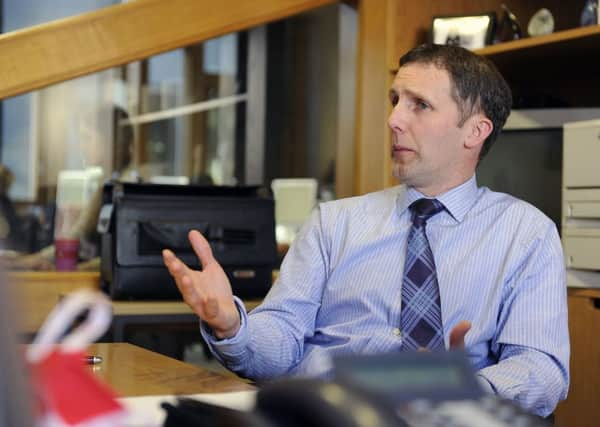U-turn over plan to scrap corroboration


Justice secretary Michael Matheson said he would remove the provision from the Criminal Justice (Scotland) Bill currently making its way through the Scottish Parliament.
His predecessor Kenny MacAskill had pushed for corroboration – which requires two independent pieces of evidence for a case to come to court – to be removed as a way of increasing conviction rates in rape cases.
Advertisement
Hide AdAdvertisement
Hide AdBut Mr Matheson said he wanted more time to consider the move following the publication of a report by Lord Bonomy which looked at legal safeguards.
Published yesterday, Lord Bonomy’s report made a series of recommendations, including a requirement that police video all interviews with suspects and that the practice of dock identification – when the accused is identified as the perpetrator in court – be ended.
Mr Matheson said the proposals were “substantial and complex” and would have a considerable impact on the justice system.
He said: “The issues that Lord Bonomy has raised are of crucial importance and I want to make sure we take the time to consider them fully.
“The Scottish Government will look at Lord Bonomy’s detailed recommendations as a package, alongside consideration of measures to improve access to justice for victims including the corroboration requirement itself.
“We all recognise the added difficulties of prosecuting crimes committed in private, and we all share the belief that victims of crime deserve access to justice. Despite this, it has not been possible to build a consensus around the corroboration rule at this time.
“On that basis, it is clear to me that proceeding with the removal of the corroboration requirement in the Criminal Justice Bill would be neither appropriate nor feasible.”
The justice secretary said the Scottish Government remained dedicated to protecting victims of crimes such as domestic abuse, rape and sexual offences.
Advertisement
Hide AdAdvertisement
Hide AdHis decision was welcomed by the legal fraternity, much of which had been critical of the decision to scrap corroboration, but political opponents said the justice secretary had been forced into an embarrassing climbdown.
Alistair Morris, president of the Law Society of Scotland, said: “We consistently stated that the proposal to remove the corroboration requirement in criminal proceedings should be subject to a full review.
“We also expressed concern about the speed of the process. Deferring this until the next parliamentary session will allow further consideration of this complex area of law and further scrutiny of necessary safeguards within criminal proceedings.”
The Faculty of Advocates said failure to properly implement the safeguards outlined by Lord Bonomy would leave Scots law at risk of miscarriages of justice, a point echoed by the Scottish Criminal Bar Association, which said the removal of corroboration remained a “very dangerous proposal”.
In a statement, it said: “We are delighted that Mr Matheson has shown the maturity to listen to the arguments and to walk away from this unpopular proposal.”
Mr MacAskill, who was replaced as justice secretary in November, had been forced to rely on the SNP’s majority to ensure the corroboration proposal remained in the justice bill by just three votes.
Despite political opposition, the plan to take away corroboration was welcomed by police, victims’ groups and prosecutors, with some arguing its removal would make it easier to take cases of sexual assault and domestic abuse to court.
Labour’s justice spokesman Hugh Henry said: “Today’s
U-turn is a humiliation for Kenny MacAskill, who just 14 months ago shamefully attacked all those who raised concerns about the abolition of corroboration as ‘abandoning the victims of crime’.
Advertisement
Hide AdAdvertisement
Hide Ad“The Scottish Government has been forced to listen to the criticisms and I am glad to see that this juvenile approach to our criminal justice system has been abandoned.
“Despite 14 months of delay, finally the government has reached the same conclusion recommended by the parliament’s justice committee and Scotland’s legal profession many months ago.”
Liberal Democrat MSP Alison McInnes said: “We shouldn’t forget that he [Kenny MacAskill] was backed by the entire cabinet and I do wonder if the [current] cabinet secretary regrets his government’s obstinacy on this.”
Conservative MSP Margaret Mitchell said: “This is most certainly the right thing to do, particularly after the former justice secretary Kenny MacAskill so arrogantly forced it through last year.
“We believe corroboration should be retained in Scots law.
“The criminal justice system has to be fair and balanced for those accused of crimes, and the victims of crime. The hasty and ill-thought-out removal of corroboration would have jeopardised that.”
Former High Court judge Lord Bonomy’s final report recommended that corroboration should be kept for evidence that is related to a confession or hearsay – an account given by a witness about a statement made by another person.
The report said: “The appropriate way to safeguard those faced with the prospect of conviction on the basis of decisive hearsay evidence would be to provide for an exception to the abolition of the corroboration requirement.
“It is the conclusion of the review that retention of the corroboration requirement, where a confession would otherwise be the sole or decisive evidence against the accused, is essential to ensure public confidence in convictions based on confessions, and consequently public confidence in the criminal justice system.”
Advertisement
Hide AdAdvertisement
Hide AdLord Bonomy added: “It should never be forgotten that some individuals are either practised liars, plausible rogues, consummate actors, or combinations of one or the other, or that those suspected of a crime and in custody may be in a particularly vulnerable position.”
FOLLOW US
SCOTSMAN TABLET AND MOBILE APPS